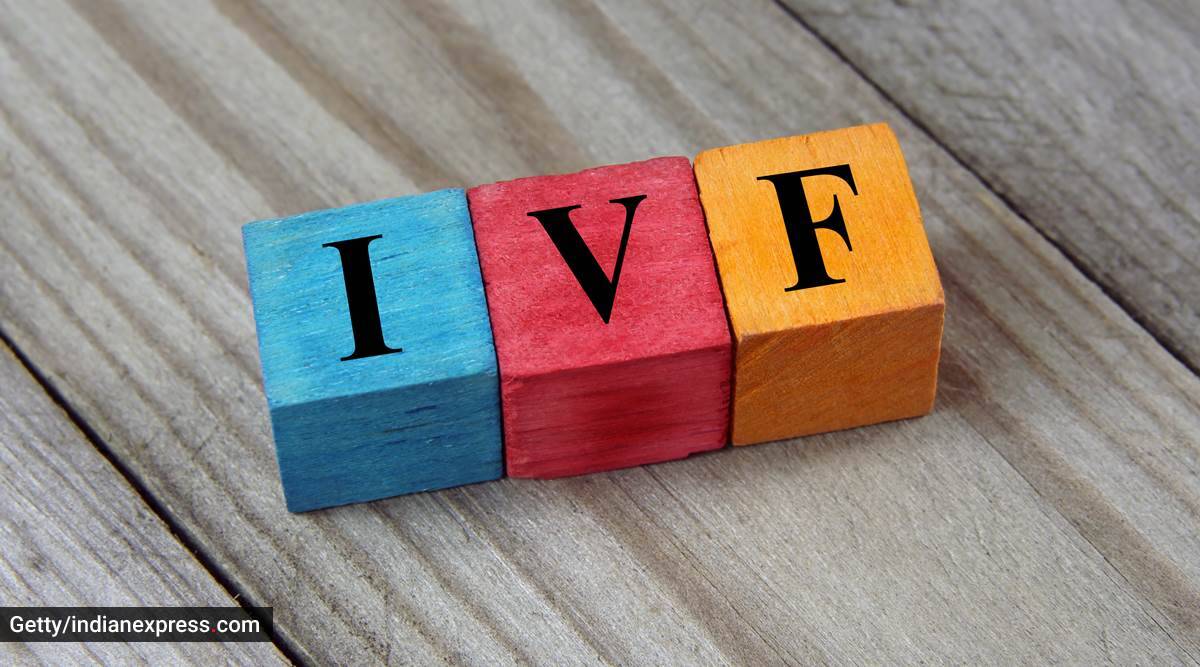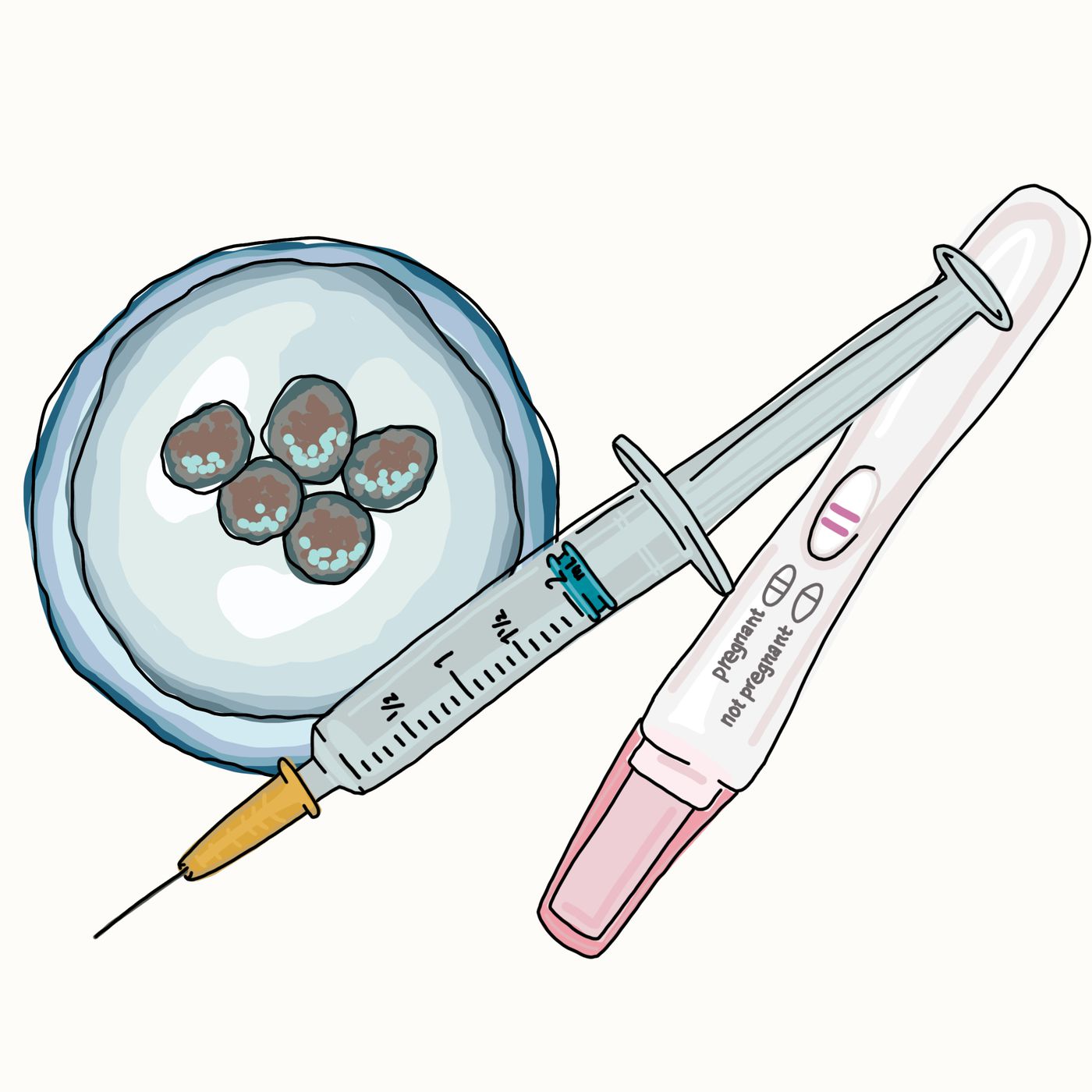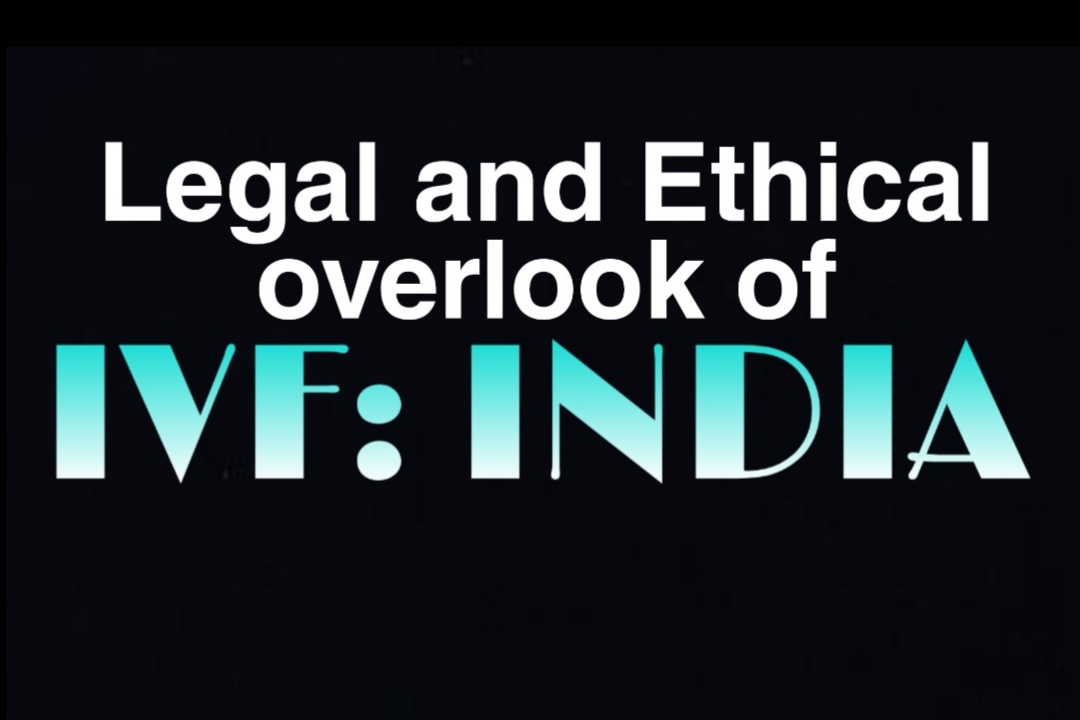This article examines the legal and ethical difficulties surrounding IVF in India, as well as the regulations that govern it. It also covers the history of IVF and India’s first test-tube baby. It focuses on the advantages and disadvantages of the New Assisted Reproductive Technology Regulation Bill, 2020, as well as the current state of IVF.
Introduction

Vitro Fertilization (IVF) has given hope to millions of people who have been denied motherhood over the years. Many people have smiled as a result of this false method of granting motherhood. This technology is used by people who are unable to conceive naturally. Furthermore, the most significant advantage of IVF is a successful pregnancy and the birth of healthy children. There are an estimated 5 million IVF babies born around the world. However, as science progresses, new legal and social issues have arisen. In India, IVF is legal, although there is no explicit legislation that governs it.
The historical origin of IVF

IVF is generally an idea of a modern technique in the field of fertility treatment. But, the history of IVF traced back much further than this. In 1978, the first experiment with IVF was begun, when Samuel Leopold Schenk, Viennese embryologist, collected ova (egg cell) from rabbits and guinea pigs. He instituted sperm to the collected egg cell and noted the cell division could occur outside the mammal’s body.
Gregory Pincees and Ernst Vinzenz Enzmann took things a step further in 1934. They also collected the rabbit egg cell and introduced sperm to the rabbit cell while they were outside the body. They later implanted the egg back into a rabbit’s uterus and the rabbit became pregnant.
Even though the eggs were implanted before fertilization had occurred. Just 12 hours after, the fertilization occurred in the rabbit’s body.
Scientist Min Chueh Chang in 1959, was able to depict that seamen need to reach a certain phase and maturity before they are ready to be fertilized. Using this information and experiment from his forerunners change was finally visible by successfully impregnating a rabbit via in Vitro Fertilization.
First Human IVF Procedure
In 1968, gynecologist Patrick Steptoe and professor of human reproduction Robert Edward attempted the first human pregnancy with IVF. They were removed successfully and were able to fertilize many mature eggs, however, they had difficulty implanting the embryos into the female womb.
They began working with Lesley and John Brown, an infertile couple, in 1976. They ultimately completed their first successful deployment of a fertilized egg with this couple.
On July 25, 1978, Lesley became pregnant and gave birth to their daughter Louise Brown. Louise was the first test-tube baby in the world. Since then, IVF techniques have improved significantly, and millions of children have been born as a result of this groundbreaking reproductive treatment.
India’s First test-tube baby
The first attempt at IVF in India was done by Dr. Subhash Mukhopadhyay. The first child through IVF was born in 1981 in Kolkata named Durga. Dr. Subhash Mukhopadhyay claimed that he has created India’s, first test-tube baby. But at that time the West Bengal government denounced the claim of Dr. Subhash Mukhopadhyay on ethical and moral ground. In 1981, Dr. Subhash Mukhopadhyay commits suicide in frustration.
In 1986, pioneering Doctor TC Anand Kumar and gynecologist Indira Hinduja claimed that they had created India’s first test-tube baby and Harsha Chawda was declared as the first test-tube baby in India by ICMR. But Dr. TC Anand while browsing through some documents got to know about Dr. Subhash Mukhopadhyay. He researched about him and got to know that the first test-tube baby in India was created by Dr. Subhash Mukhopadhyay in 1981. He wrote the article published in a journal ‘Current Science’, entitled “Architect of India’s First test-tube baby”. Finally, in 2005, the Indian Council of Medical Research recognized Dr. Subhash Mukhopadhyay’s contributions and upheld his claim.
The scientific meaning of IVF
IVF is an advanced fertility treatment in which fertilization takes place outside the body. It is used to treat infertility where other types of reproductive technology like surrogacy etc. have failed. In this treatment, women’s eggs and male semen are combined in a laboratory. Women in this treatment have to go through various IVF treatments before she gets pregnant.
Is IVF safe?
IVF is generally thought to be a safe treatment, but because it is a medical procedure, it does have some adverse effects, one of which is Ovarian Hyperstimulation Syndrome. It occurs when the ovaries produce an excessive number of eggs. Because there are several embryos, it can potentially result in multiple pregnancies. Multiple pregnancies are reported to occur in 30% of IVF cases. IVF is also more likely to result in an ectopic pregnancy.
Process of IVF

IVF process involves 4 steps:
- Removal of eggs –Hormone injections are given to the patient during this procedure to aid in the rapid maturation of the eggs. Several days before the eggs are to be extracted from the body. The eggs will then be removed using a small surgical procedure known as follicular aspiration. The doctor will utilize ultrasonography to insert a tiny needle into the ovaries through the Vaginal canal. This needle is equipped with a mechanism that allows the eggs to be taken out one at a time.
- Collecting sperm from a partner or donor- the partner has to provide a sperm sample or a person can choose a donor sperm. These sperm are put through a high-speed wash and spin cycle to find a healthy one.
- Unite sperm and egg- In this process, the best sperm and best egg are combined. This stage is called insemination. It takes hours for a sperm to fertilize the egg. Doctors directly inject sperm into an egg and this process is called Intracytoplasmic Sperm Injection.
- Transfer of embryos in Uterus- After 3-5 days of Fertilization, the doctor will place the fetus into the womb by using a catheter.
Legal and Ethical Issue In IVF
As we know how adventurous IVF is and due to this there are various debates on the legal and ethical value system of IVF that question IVF treatments.
- Ethical wrong did with Pre Embryo-Today, 6 billion people throughout the world have created a child through IVF. However, there is no mention of what happened to the extra fetus. As previously stated, numerous embryos are utilized during the IVF technique to enhance the chances of conception, but only one embryo is used at a time, and the embryos that are not used are frozen for research. These embryos are not implanted in the uterus and are either destroyed or used for research. Some say that because an embryo or fetus is considered an individual, killing it is unethical. It’s equivalent to the slaying of a single person. And, if an embryo is acknowledged as a unique entity, its right to life should be safeguarded from the start. Many others, on the other hand, believe that embryos are not human.
- Defects in babies born from such technology-The success of IVF is determined by the IVF technique. The key worry throughout the operation is to monitor the treatment’s safety, as the treatment has the potential to produce a variety of abnormalities and diseases. Children born through IVF may be shorter in stature than other children, and they may be underweight. It can potentially result in numerous pregnancies.
- Multiple pregnancies– As IVF success depends upon the number of fetuses transferred into the uterus. Sometimes this process can cause multiple pregnancies. Which is a threat to the mother as it causes bleeding in the uterus and high blood pressure.
- Who owns stored extra embryos – The IVF process produces extra embryos. Couples save it for the future, in case they wish to have another child or if one of them dies from a disease. The major goal of keeping the embryo or gametes is to ensure that genetic identity is maintained after one partner dies. However, the fundamental concern is whether or not the living partner has the legal right to use them for IVF. Would someone who saved sperm cells or embryos want to procreate after they died? Anyone who decides to store embryos and gametes is believed to have given their consent. The permission does not, however, include the possibility of death. The use of deceased gametes is prohibited in various nations, including Sweden, France, and Germany. In the United Kingdom, a deceased person’s sperm can be used for IVF if a written agreement is given before death. The use of post-mortem sperm retrieval poses several concerns.
- Commercialization of IVF – In India, IVF treats embryos as a commodity because it is very natural in buying and selling. Parents are treating a child through IVF as a commodity as a descendant can be altered through IVF. No one has the right to disturb the natural process to achieve the result through artificial means.
- Right of the child born from IVF – In India the right of the child born out-off IVF are given through Assisted Reproductive Technology (ART) Regulation Bill, 2020. It allows a child born of IVF to enjoy all the rights as a natural biological child to protect the child from exploration. This bill made it compulsory to conduct a test to identify the genetic defects in the embryo.
Laws related to IVF in India
There was no explicit law dealing with IVF in India before 2020. Each state has devised its method of regulation. The Indian Council of Medical Science regulates it in India (ICMS).
Following the birth of India’s second test-tube baby in 1986, a slew of IVF clinics sprung up across the country with no regulatory authority or government oversight, prompting the ICMR to draft National Guidelines for ART Clinics in India in 2002. After significant modifications, the Ministry of Health and Family Welfare assessed the guidelines and released them in 2005.
The following are some of the ICMS guidelines:
- The clinic does not reveal any of the donor’s personal information.
- The clinic should not use the sperm preserved if the person is under the age of 21.
- The child born through IVF should be considered a legitimate child as it is done with the proper consent of the parents.
- Couples should be given compulsory counseling before the procedure.
- Human embryos should not be placed in a non-human body and all the research on embryos should be done after taking consent from the Institutional ethical committee.
To make separate laws related to IVF, the Central Government has approved the Assisted Reproductive Technology Regulation Bill, 2020. It is a path-breaking bill for women in the country. Under this bill, the Government will make a “National Board ” which will regulate IVF clinics across the country. This board will make a code of conduct that should be kept by the employees working in the clinic and will decide the minimum standards of work and working environment to be maintained by the clinic.
This bill has banned the sale of human embryos. The person who is involved in the trafficking of human embryos shall be fined 10 lakh Rupees for the first time and if committed a second time then he /she would be liable for imprisonment of 12 years.
But this bill also has side effects. This Act excludes single men, heterosexual couples, and LGBTQ+ individuals and couples. It is a clear violation of Article 14 under the Indian Constitution. In the Puttaswamy case, the Supreme Court held that ” the purity of marriage, the freedom of procreation, the choice of family life and the dignity of being concerned for all individuals irrespective of their social status and privacy. This bill required the written consent of the egg donor but did not provide her the ability to withdraw her consent before or during the procedure. Women do not receive any compensation for expenses of loss of salary, time and efforts”.
Landmark Judgements

Delhi IVF & Fertility Clinic vs Dr.(Mrs.) Lina Goya
In this case, the Clinic was found guilty for deficiency in service as post-care requirements were not provided effectively. The court has directed the clinic to refund fee/medicine/investigation charges/room charges etc. Apart from this 25,000 was given to the respondent as compensation for mental and physical suffering by them. And 5,000 was given as a litigation charge.
Maharashtra High Court in a recent ruling, The wife has filed an appeal under Section 9 of the Hindu Marriage Act, 1955, for restitution of the marriage in this case. She asked for the respondent spouse to father a second child, either through the recovery of conjugal rights or IVF. The couple is going through a divorce, and their 7-year-old kid is in his mother’s custody. Because the matrimonial petition was still pending in another court, the Nanded family court dismissed the wife’s application for recovery of conjugal rights to conceive another child. The court did, however, consider the wife’s plea for IVF to create a second child. A judge has ordered the husband to donate his sperm for IVF. The husband appealed the ruling of the family court to the High Court. HC set aside the order passed by the family court on the ground that the plea filed by the wife is premature.
XXX v. State of Kerala
Kerala High Court landmark Judgement, In this case, the court, allowed the appeal of a single mother who got pregnant through IVF, seeking a directive to the state government to set aside the column requiring to mention the details of the child’s father from the birth certificate. The court orders the government to prescribe separate forms for registration of birth and death for issuing certificates in cases related to ART.
Current scenario of IVF
In the last five years, India’s fertility market has expanded at a CAGR of 20%. In a given year, the country performs roughly 2-2.5 lakh IVF cycles, with the capacity to perform 5-6 lakh. IVF has become more well-known. These folks are being reached by health care professionals, who are making treatment available and cheap. Everyone is made aware of the importance of reproductive health. There are between 1,500 and 2000 IVF clinics in India, with 400 of them registered. The success rate of IVF has been raised from 30% to 55% by 2020. The Indian IVF services market was worth $478.2 million in 2018 and is expected to grow at a CAGR of 14.7 percent to $1,453.0 million by 2026, according to the study.
Conclusion
Around 10% of people in India struggle from infertility, and IVF is a treatment that allows people to experience parenting. IVF is a legal method, as we have seen, but there is no special law governing it. The government should pass the Assisted Reproductive Technology Regulation Bill to regulate IVF in India. This bill has the authority to resolve all ethical and legal issues around IVF. However, because this bill has significant flaws, it should be amended to include cohabiting straight couples as well as LGBTQ+ persons and couples.
Relevant links
https://indiankanoon.org/doc/98741513/?type=print
FAQs
Who first started the experiment with IVF?
Ans. In 1978, the first experiment with IVF was done by Samuel Leopold Schenk.
Who was India’s, first test-tube baby?
Ans. The first child through IVF was born in 1981in Kolkata named Durga.
Who is responsible for the first human pregnancy through IVF?
Ans. The first attempt at Human Pregnancy through IVF was done by gynecologist Patrick Steptoe and Professor of Human reproduction Robert Edward in 1968.
Does a Child born through IVF have the same rights as a natural biological child?
Ans. In India, the right of children born out-off IVF is given through Assisted Reproductive Technology (ART) Regulation Bill 2020. It allows a child born of IVF to enjoy all the rights as a natural biological child to protect the child from exploration. This bill made it compulsory to conduct a test to identify the genetic defects in the embryo.
Who has the Power to control IVF clinics all over the world?
Ans. Indian Council of Medical science(ICMS).
Which countries have prohibited the use of deceased gametes?
Ans. Sweden, France, and Germany prohibit the use of deceased gametes.
Who was the first test-tube baby in the world?
Ans. Louise became the world’s, first test-tube baby.
